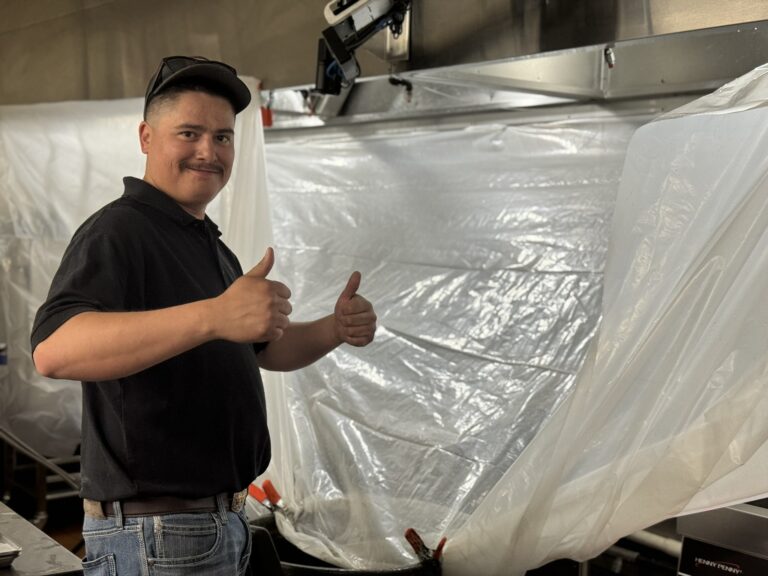Every commercial kitchen must have a commercial fire suppression system. That’s non-negotiable requirement!
The presence of heat, open flames, and cooking oils means that the risk of fire is always there.
Designed to detect fire early and put it out quickly, fire suppression systems help protect your employees, customers, and property.
In this article, we will further examine the practical measures necessary to service a kitchen hood fire suppression system as well as ideas on how to ensure they continue to operate as they should and help keep your kitchen both safe and code compliant.
What Are Fire Suppression Systems Made Of?
A commercial kitchen fire suppression system consists of detection sensors, control panels, and suppression agents. These systems are integrated into hood systems and installed over cookers like fryers, grills, and ovens.
When it detects a fire, the system releases a wet chemical agent that cools the fire, prevents it from re-igniting and creates a barrier to keep flames from spreading. The system also cuts off gas and electricity to the affected equipment, limiting the risk of additional damage.
The Importance of Routine Kitchen Hood Fire Suppression Maintenance
There are multiple reasons why you should have fire suppression system maintenance regularly carried out:
- Verify Functionality: Providing regular inspection and maintenance work makes sure that each part of firefighting system is in their role. This involves testing sensors, control panels and the suppression agent to verify that they are activated properly in the case of a fire.
- Regulatory Compliance: Regular inspection and maintenance of fire suppression systems are mandated by fire codes and safety regulations. There are serious penalties tied to data breach non-compliance: Fines, legal liabilities, and the possibility of shutting your business down.
- Increased System Lifespan: Routine maintenance can prolong the life of your fire suppression system, allowing it to function effectively long into the future while also saving you from investing in expensive replacements.
- Downtime Prevention: If not addressed, fires can cause major disruptions in your kitchen operations, a well-maintained system can quickly address any potential risks before they become out of control.
What Are the Best Practices for Fire Suppression System Maintenance?
Regular inspections carried out by certified professionals are the key to proper functioning of fire suppression systems. Because they can spot problems that may not be obvious to an untrained eye. Inspections should be performed at least biannually, but local rules may dictate more frequent inspections.
As part of these inspections, all elements of the fire suppression system should be tested. This includes verifying that the detection sensors are functional and able to provide appropriate information regarding heat or smoke, ensuring that the control panels remain responsive and can trigger the suppression system without latency, and checking the levels and condition of the suppression agent, and refilling or replacing as needed.
Maintenance is extremely important in keeping fire suppression systems working properly, since grease and debris can block sensors and other components. The hood filters should be washed or replaced regularly, and all kitchen equipment should be regularly cleaned. Same goes for maintenance, the routine upkeep of a fire suppression system that can help prevent obstructions from blocking the fire control system and allow it to perform well if a fire were to occur.
More Fire Safety Tips for a Commercial Kitchen
All kitchen employees are trained on the use and maintenance of the fire suppression system. They should know how to manually activate the system in the event of an emergency, and understand the importance of keeping the system clean and clear of any obstructions.
The fire suppression system may, over time, be less effective than it should be as some components become deprecated or degraded over time.
These pieces should be checked and replaced as needed regularly to make sure your system is following the newest safety codes and 0080 standards.
It is to keep detailed records of all maintenance work carried out and inspections which can be very important to require during inspections from fire safety authorities and when you need to keep track of when your next maintenance is due.
Fire safety codes can change, so keep current with new fire safety regulations and revise your maintenance processes accordingly.
A solid fire safety program is essential to efforts to ensure for the safety of employees to in the event of a fire; hold regular emergency drills so your staff know what to do, should a fire actually occur, and give your staff hands-on when it comes to fire safety protocol compliance and procedures.
Partner with Kitchen Fire Hood Professionals
Fire suppression systems are not just for your commercial kitchen requirement; they need regular maintenance as per the local warehouse regulations. With the above steps and recommendations, you can keep your kitchen safe, compliant, and running.
Fire safety is so important, and here at Brazas Fire, we are dedicated to providing high-quality fire suppression systems and expert guidance. We help ensure that your kitchen hood stays clean and compliant. We are the hood cleaning experts in New Mexico! For further details, get in touch with us now by calling 505-889-8999!
